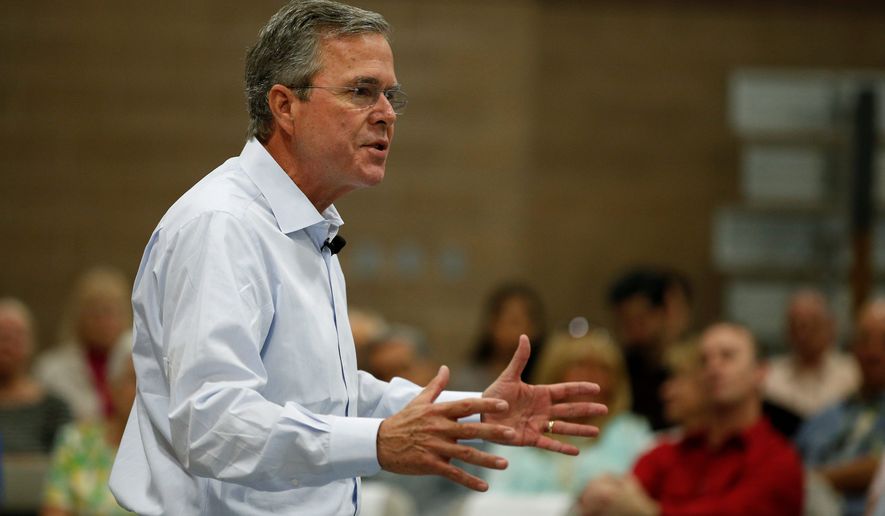Two major Supreme Court rulings have reshuffled the GOP presidential primary, shooting domestic and social issues to the top of the debate and leaving the candidates to grapple with an increasingly liberal general electorate.
The rulings in favor of Obamacare subsidies and same-sex marriage sparked a flurry of responses from the White House hopefuls that ranged from forthright anger to carefully crafted messages of acceptance, providing some insight into the strategies the crowded field plans to employ on the campaign trail.
“It’s a conundrum,” said Tim Malloy, assistant director of the Quinnipiac University Poll. “If a given GOP candidate takes too strong a position on same sex marriage to please the base and win a primary, they face a reckoning down the road when they have to win over independents or disaffected Democrats” in November.
Polls show calling for the repeal of Obamacare is a winner among GOP primary voters, but carries less appeal with other voting blocs.
Poll have found that a majority of Independents and Democrats hoped the Supreme Court would not block federal subsides under Obamacare.
The partisan divide is more stark on same-sex marriage.
A recent Washington Post poll found that 61 percent percent of voters support gay marriage and think states should recognize such unions.
The survey, though, also showed a deep partisan divide, with 63 percent of Republicans saying they oppose gay marriage, compared to 21 percent of Democrats and 30 percent of Independents. A majority of Republicans surveyed said they supported a state’s right to define marriage to exclude such unions.
As a result, Republican presidential candidates face a dilemma over how to stand with their base on the issue without alienating general election voters.
The Republican National Committee touched on the balancing act in its post-2012 election report, warning the issue resonates with young voters.
“Already, there is a generational difference within the conservative movement about issues involving the treatment and the rights of gays — and for many younger voters, these issues are a gateway into whether the party is a place they want to be,” the report said.
Still, the party platform reads: “the union of one man and one woman must be upheld as the national standard, a goal to stand for, encourage, and promote through laws governing marriage.”
With that as a backdrop, some GOP presidential candidates signaled that Friday’s Supreme Court ruling means that battle is over and they were shifting their focus to ensuring that religious liberty is protected. They quickly shot down the idea of reviving the push for a Constitutional amendment defining marriage as being between one man and one woman.
“Rather than pursing a divisive effort that would be doomed to fail, I am committing myself to ensuring the protection of religious liberties of all Americans,” Mr. Graham said. “No person of faith should ever be forced by the federal government to take action that goes against his or her conscience or the tenets of their religion.”
Former Gov. Jeb Bush and Sen. Marco Rubio, both of Florida, also treaded carefully, saying the decisions should have been left up to the states to decide.
“I also believe that we should love our neighbor and respect others, including those making lifetime commitments,” Mr. Bush said. “In a country as diverse as ours, good people who have opposing views should be able to live side by side. It is now crucial that as a country we protect religious freedom and the right of conscience and also not discriminate.”
Mr. Bush’s remarks were noteworthy in that they came roughly a decade after his brother, President George W. Bush, won a second term after getting behind a series of referendums in key battleground states that defined marriage as the union of a man and a woman.
Public opinion has since shifted dramatically. A NBC/Wall Street Journal survey showed that six in 10 voters opposed gay marriage in 2004. Now six in 10 support it.
Still, some Republican presidential candidates, who are looking to win over social conservatives, are pledging to fight the ruling.
Former Arkansas Gov. Mike Huckabee described the decision as an “act of unconstitutional judicial tyranny.”
“I will not acquiesce to an imperial court any more than our Founders acquiesced to an imperial British monarch,” Mr. Huckabee said. “We must resist and reject judicial tyranny, not retreat.”
“The Supreme Court can no more repeal the laws of nature and nature’s God on marriage than it can the laws of gravity,” he said.
Gov. Scott Walker of Wisconsin called for an amendment to the Constitution to “reaffirm the ability of the states to continue to define marriage.”
The responses contrasted to former Secretary of State Hillary Clinton, who opposed same-sex marriage during her last presidential campaign (as did then-Sen. Barack Obama). But she signaled that she plans to use the issue against her rivals if she is the Democratic presidential nominee.
“As love and joy flood our streets today, it is hard to imagine how anyone could deny the full protection of our laws to any of our fellow Americans — but there are those who would,” Mrs. Clinton said.
• Seth McLaughlin can be reached at smclaughlin@washingtontimes.com.




Please read our comment policy before commenting.